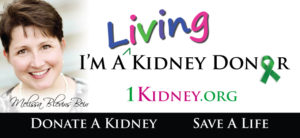The State of Arizona recognizes Living Kidney Donors as life-saving humanitarians who inspire our community to “give back” in bigger and bolder ways in Arizona’s HCR 2042 proclamation resolution for Living Kidney Donors Days in 2018.
Over 100,000 end-stage kidney disease patients nationwide pray their name will make it to the top of the list, so they can get a life-saving kidney transplant. The average wait for a deceased donor’s kidney is four and a half years; in some regions, the wait can be as long as nine years. Yet, there is a way to end this wait and improve outcomes, if communities were better informed.
Arizona State Representative Heather Carter teamed with TransplantFirst Academy founder, Risa Simon on March 8, 2018, to re-introduce resolution proclamation, HCR 2042, to make March 8, 2018 Living Kidney Donors Day in the state of Arizona. This renewal initiative is intended to extend statewide awareness and recognition in living kidney donation.
By design, the proclamation falls on World Kidney Day and Donor Network of Arizona’s Donate Life Day, to further expand collaborative efforts to expand awareness. Simon said, “Since living kidney donors don’t wear a Medal of Honor or a superhero’s cape, it’s often hard to recognize them. They deserve a lifetime achievement award for the role they play in saving lives and inspiring community citizens to give back in bigger and bolder ways.”
The significance behind HCR 2042 is that it represents hope for nearly 2,000 people in Arizona who are in desperate need of a kidney transplant. The names of these individuals reside on a list with a 3 to 5 year waiting period. Sadly, 90 names are removed from that list each year when patients die while waiting for their much-needed transplant. Another 50 Arizonans are removed from the list due to advanced illness, which often disqualifies them from ever receiving a transplant.
The good news is that each year approximately 575 people in Arizona are removed from the list because they received a kidney transplant. The bad news is that the list and its wait never gets any shorter. This quagmire exists because an additional 865 new names are added every year (290 more than those removed). This impossible balancing act and its life-threatening challenge continue to disrupt organ donation supply and demand.
Living kidney donation, however, holds the potential to course-correct the destiny of this deadly foregone conundrum. Simon asserts, “Our organ shortage stems from a lack of education and awareness.” She describes the statewide proclamation as a befitting salute that increases awareness and right-doing. She went on to say, “the noble acts of living kidney donors don’t end after donation. Their gift represents more than one-life saved. Their actions live on to inspire ordinary people to seek extraordinary ways in which they can engage in life-saving opportunities for others in need.”
As a recipient of a live-donor kidney transplant, Simon said, “While those of us who were blessed with a transplant from a living donor will be forever grateful, we must not forget those left behind. Living kidney donors embody the promise of a better life and a better tomorrow. Now we need to make it a better life and a better tomorrow for all.”
One of those humanitarians is Kati Walker, a living kidney donor who donated one of her kidneys to her children’s elementary school principal in Cave Creek, Arizona. Kati has since become a strong advocate for living kidney donation and an inspirational spokesperson for the TransplantFirst Academy. Post-donation, Kati’s active life remains full of love and joy. Even after her donation, she continues to give back at every turn. There’s no prompting needed when you hear Kati affirm her kidney donation was “one of the best decisions I ever made!”
To date, more than 145,000 living kidney donors have selflessly saved an equal number of lives, over 2,800 of whom were saved in Arizona. We salute them all and are hopeful more good-hearted Samaritans will follow Kati’s lead. Last year, living kidney donor transplants dropped down 39% from 2009 in Arizona alone. Through increased awareness, the TransplantFirst Academy and other organizations, like the National Kidney Foundation of Arizona and the Erma Bombeck Project, believe Living Kidney Donor’s Day holds great promise by shining light on increased awareness and recognition that can lead to a better and longer life for all.
About TransplantFirst
TransplantFirst Academy is a 501c3 non-profit organization based in Phoenix, dedicated to empowering kidney patient outcomes and increasing living kidney donor awareness. For more information, visit: TransplantFirst.org. To request an interview, contact TransplantFirst’s founder/CEO, Risa Simon, at (480) 575-9353 or via email at risa@transplantfirst.org
# # #



 TransplantFirst Academy is raising community awareness in living kidney donation.
TransplantFirst Academy is raising community awareness in living kidney donation.